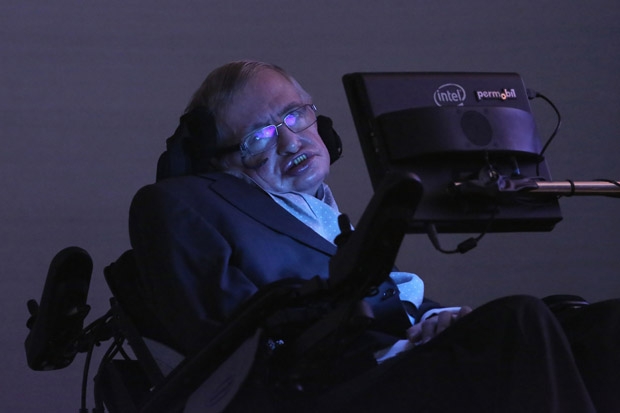You don’t expect to be brought close to tears by the Reith Lectures, which are after all at the most extreme end of Radio 4’s commitment to ‘educating’ its audience. Yet when Stephen Hawking delivered this year’s talks at the Royal Institution in London (in front of a lucky audience of listeners and scientists) there was both much laughter and a heightened sense of emotion.
This was not because of his plight — the eminent professor of theoretical physics has suffered from a rare form of motor neurone disease since the age of 21 and the only discernible movement in his body is in his eyes, and the twitching of his facial muscles. Nor his cheeky sense of humour, or his grace and dignity, although these are remarkable enough. It’s not even the way he has continued to work, undaunted by the obstacles presented by his illness, dependent now on those facial twitches as the only way he can make himself understood. No, what really impresses beyond words is the way he has used his most unusual intellectual capacity not just to pursue his ideas about the cosmos but to find new ways of living day-by-day, and thereby to show others suffering also from neuro-degenerative disorders what is still possible when so much else is lost. He challenges us all to recognise what we could and might be.
Even though what we heard was not Hawking but the sound of a totally synthetic voice, manufactured by technology from the slightest of movements, his character shone through everything he said. His thoughts could only be made plain to us through painstaking work by him, word for word, at a rate of about one word per minute, combined with state-of-the-art artifice. And yet we did feel as if a real connection had been made, that he was speaking directly to us. Just witness the applause that came at the end.
His subject was the black holes that have dominated his research career, those as yet unknowable areas of dark matter, unpenetrated by the light, into which anything that falls will not escape. They are, says Hawking, the most fascinating aspect of cosmology because of their very existence, and their unknowability. Much more than that, though, Hawking shows us that it is only when we think beyond our earthly limits, our human confines, that we can be said to be truly human.
In the question-and-answer session that followed his talk, Hawking was asked what inspires him to keep going, to which he replied: ‘My expectations when I turned 21 were reduced to zero. In this situation it was important to appreciate what I did have.’ He went on to explain that he has been ‘fortunate in almost everything else’ and especially to work in theoretical physics at such an exciting time. ‘It’s important not to get angry,’ he said. ‘You can lose all hope if you can’t laugh at yourself and at life.’ The first of the two lectures (presented by Sue Lawley and produced by Jim Frank) goes out next Tuesday. Don’t miss them. You might not afterwards be able to explain why it’s important not to fall into a black hole, but you will have been given the hope that all is not lost if by mischance you do.
On Thursday of this week Radio Five Live extended its usual remit into the far reaches of one of the largest and most up-to-date hospitals in the UK, Queen Elizabeth in Birmingham, made famous by Malala Yousafzai who was sent there for treatment in 2012 after she was shot and severely wounded in Pakistan. The idea was to provide ‘a snapshot of a day in the life’ of the hospital by taking Five Live’s microphones inside for 24 hours and talking to patients and staff, from the chief executive to the cleaner.
Like flies on the wall we spent time inside the operating theatre as one patient underwent surgery on cancer of the jaw. We could hear the monitors beeping in the background but otherwise it sounded really normal. Not at all like the sterile, terrifying atmosphere you might expect. There was an underlying hum of conversation, just like in an office, as the dozen or so people actually involved in the operation talked about what was going on. It felt odd listening in, and realising this was their daily life, no chats around the watercooler or tantrums about computers that freeze.
For many of us our only acquaintance with hospital is fraught with exceptionalism, either our own rare encounter with an illness that requires hospitalisation or visiting someone who is ill. By taking us inside the experience in a way that just could not be done on TV (it would be too intrusive for patients and also for doctors and surgeons), Radio Five Live hopes to build on the work it did last year by following a heart-transplant patient into the operating theatre, in real time, turning us from couch-potato followers of Casualty to active witnesses of true-life medicine.






Comments